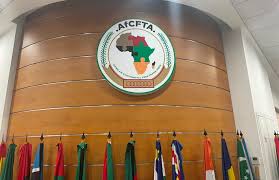Nigeria has officially inaugurated a new AfCFTA air corridor aimed at boosting exports to key African markets, including Kenya, Uganda, and South Africa. The initiative is expected to significantly reduce logistics costs for Nigerian exporters by 50% to 75%, thereby enhancing the competitiveness of Nigerian goods across the continent.
On Africa Day, the Minister of Industry, Trade and Investment, Dr. Jumoke Oduwole, announced the launch of a bold new air corridor designed to connect Nigerian goods to AfCFTA markets through Uganda Airlines.

Dr. Jumoke Oduwole highlighted that the newly inaugurated air corridor, established in collaboration with Uganda Airlines, is a strategic effort to improve the connectivity of Nigerian products to markets within the African Continental Free Trade Area (AfCFTA). The corridor aims to minimize transportation challenges and facilitate easier market entry for Nigerian businesses, thereby promoting more efficient and competitive trade across Africa.
In addition, the corridor is anticipated to facilitate the export of Nigerian textiles, cosmetics, and agricultural products, enhancing the viability and profitability of continental expansion for local businesses. By significantly lowering transport costs, the initiative enhances the competitiveness of Nigerian exporters.
The government announced that the AfCFTA tariff concessions have been officially published in the gazette. This unlocks lower duty rates for Nigerian exporters, further opening up trade opportunities under the AfCFTA framework.
Overview

The African Continental Free Trade Area (AfCFTA) represents a landmark agreement aimed at establishing a unified continental market for goods and services. The initiative seeks to significantly enhance intra-African trade and promote deeper regional economic integration across member states.
In April 2025, Nigeria formally published and submitted its ECOWAS Tariff Schedule for Trade in Goods to the AfCFTA Secretariat, enabling zero-duty access for 90% of eligible products. This positions Nigerian exporters to benefit from increased market access and improved competitiveness.
Under the phased 10-year liberalization plan starting in 2021, Nigeria has by 2025 implemented a 50% tariff reduction on trade with least-developed African countries and a full 100% cut for trade with developing African nations.
The new air corridor aligns with Nigeria’s broader strategy to lead AfCFTA implementation, especially by supporting exports of textiles, cosmetics, and agricultural goods, and leveraging digital trade to empower SMEs and tech-enabled exporters.
